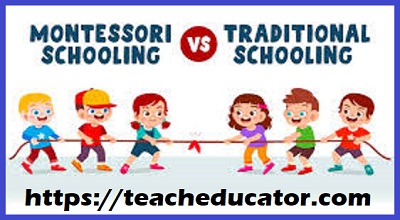Montessori Schooling Vs. Traditional Schooling
Montessori Schooling Vs. Traditional Schooling: Education plays a crucial role in shaping a child’s future, and choosing the right schooling method is essential. Two prominent approaches—Montessori schooling and Traditional schooling—have sparked debates among educators and parents. While traditional schools follow a structured, teacher-led curriculum, Montessori education emphasizes child-centered, self-directed learning.
In this comprehensive guide, we will explore the key differences, benefits, drawbacks, and latest trends in Montessori and Traditional schooling. By the end, you’ll have a clearer understanding of which system aligns best with your child’s needs.
Understanding Montessori Schooling
History and Philosophy
Developed by Dr. Maria Montessori in the early 20th century, Montessori education is based on the belief that children learn best in a self-directed, hands-on environment. The philosophy emphasizes independence, freedom within limits, and respect for a child’s natural development.
Key Principles of Montessori Education
- Child-Centered Learning: Students choose activities based on interests.
- Mixed-Age Classrooms: Encourages peer learning and collaboration.
- Hands-On Learning: Uses specially designed Montessori materials.
- Uninterrupted Work Periods: Allows deep focus and exploration.
Role of Teachers and Students
- Teachers act as guides rather than instructors.
- Students take ownership of their learning journey.
Understanding Traditional Schooling
Structure and Curriculum
Traditional schools follow a fixed curriculum set by educational boards. Learning is teacher-led, with a focus on textbooks, lectures, and standardized tests.
Teacher-Led Learning Approach
- Teachers deliver lessons to the whole class.
- Students follow a structured timetable.
Grading and Assessment Methods
- Performance is measured through exams, quizzes, and report cards.
- Emphasis on rankings and competition.
Key Differences Between Montessori and Traditional Schooling
| Aspect | Montessori Schooling | Traditional Schooling |
|---|---|---|
| Learning Style | Self-directed, exploratory | Teacher-led, structured |
| Classroom Setup | Mixed-age, flexible seating | Same-age, rows of desks |
| Assessment | Observation, progress tracking | Exams, grades, standardized tests |
| Pace of Learning | Individualized | Uniform for all students |
Benefits of Montessori Education
✅ Encourages Critical Thinking
✅ Develops Leadership and Social Skills
✅ Reduces Stress with No Formal Grades
Drawbacks of Montessori Education
❌ May Lack Rigor in STEM Subjects
❌ Transition to Traditional Schools Can Be Tough
Benefits of Traditional Schooling
✅ Clear Structure and Discipline
✅ Prepares for Standardized Tests (SAT, ACT)
Drawbacks of Traditional Schooling
❌ One-Size-Fits-All Approach
❌ High Pressure and Burnout Risks
Latest Trends in Education
- Montessori Schools Integrating Tech (e.g., coding for kids).
- Traditional Schools Adopting Flexible Learning Models.
Which is Better? Montessori or Traditional Schooling?
- Consider:
- Child’s learning style (independent vs. structured).
- Future academic requirements (college prep needs).
Conclusion
Both Montessori and Traditional schooling have unique strengths. While Montessori fosters creativity and independence, traditional schools provide structure and academic rigor. The best choice depends on your child’s personality and long-term goals.
